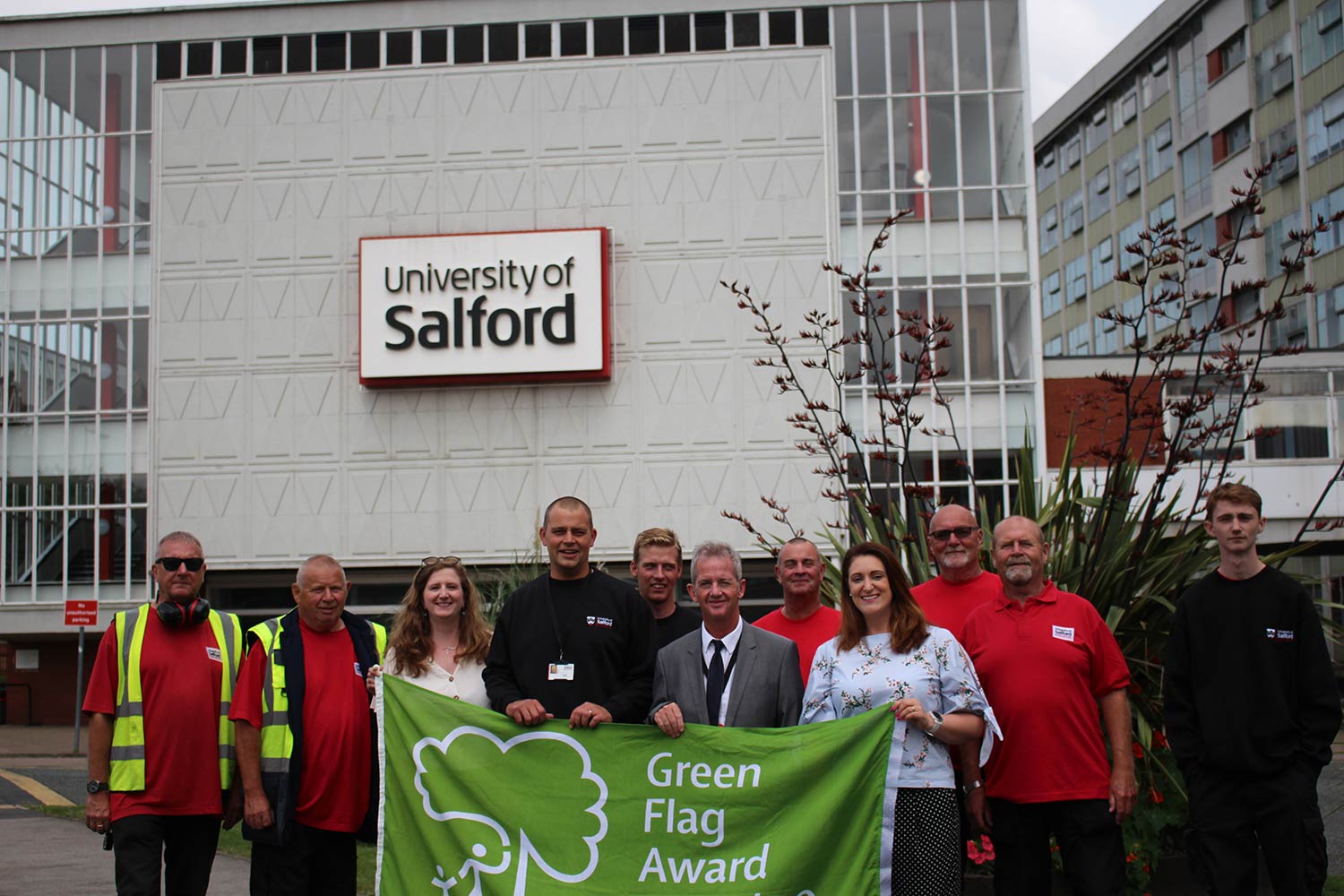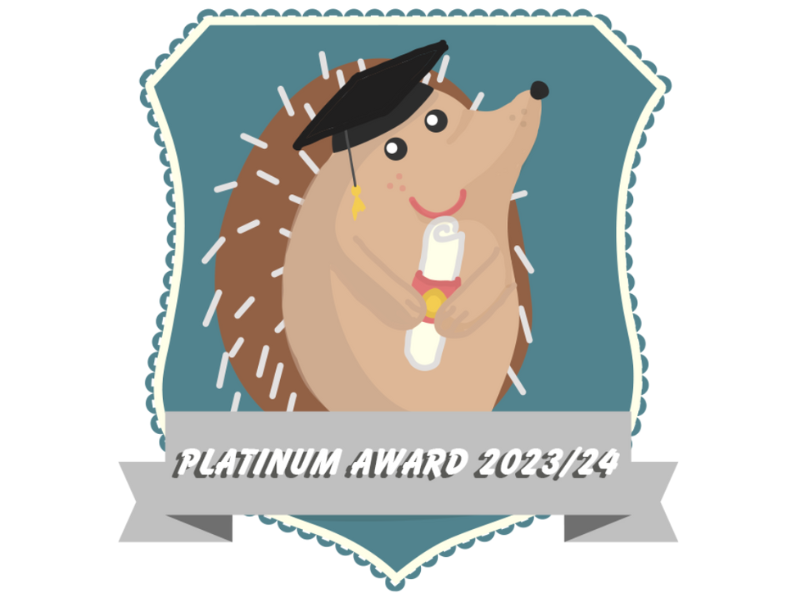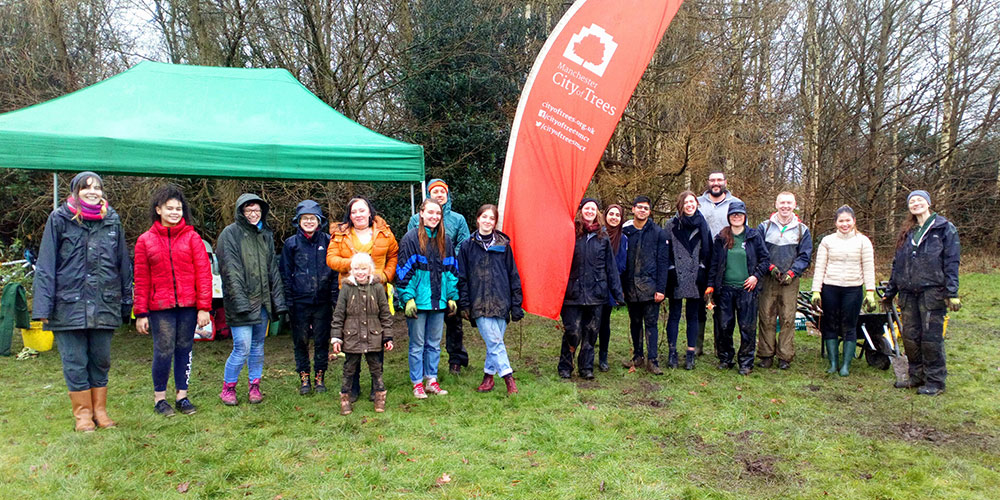Biodiversity and landscape management
In 2020, the Environmental Sustainability and Grounds Management Teams, along with colleagues in Estates and Facilities, developed a 5-year Landscape Management Plan for 2020/21-2024/25.
Our plan is reviewed and updated regularly, and it serves a framework for improvement of our management of the outside spaces on campus and enhancing biodiversity. It is submitted as part of our Green Flag Award application.
Find out about our progress so far, and the ongoing initiatives, in the video and information below.

Green Flag Award

On July 16 2019, University of Salford was first recognised by the Green Flag Award Scheme as one of the very best green spaces in the world.
The Green Flag judges described the university’s Peel Park and Frederick Road campuses as an impressive, diverse collection of sites with excellent facilities and features that complement each other well, including David Lewis Playing Fields and a selection of high-quality public art.
We raised our first Green Flag outside of The Old Fire Station at our 2019 Sustainability Awards. We have maintained the award every year since.
Our biodiverse campus
Biodiversity, or biological diversity, is the variety of life! This includes variety in habitat types as well as species diversity of plants and animals. A diverse ecosystem is important because of the roles that different species perform for the functioning of our planet; ecosystem’s have a web of codependencies (the food chain, for example) which can become unbalanced if a species disappears.
Despite being just a mile from the City of Manchester, the main site of the University of Salford is a leafy, riverside campus adjacent to Peel Park and the River Irwell. There are a large variety of trees on campus including sycamore, birch, willow, whitebeam, cherry, Norway maple, oak, hawthorn and London plane, which provide homes to Grey wagtails, goldcrests, greenfinches, blackbirds, robins and more.
The Grounds Maintenance Team prioritise native species for new planting and wildflower seeds are used instead of bedding plants in some areas. These are attractive to bees, butterflies, ladybugs or beetles!
We've created a walk around our campus, guiding you through all our best greenspaces. Take a wander and see how many species you can spot!

Hedgehog Friendly Campus

The Hedgehog Friendly Campus initiative, funded by the British Hedgehog Preservation Society, works to transform university campuses into safe habitats for hedgehogs. With UK hedgehog populations declining by up to 50% since 2000 and listed as Vulnerable to Extinction, the initiative raises awareness and encourages staff and students to address threats like habitat loss, pollution, and road dangers. The University of Salford has achieved platinum accreditation in 2023-24 for our efforts in hazard management, habitat creation, and community engagement.
Biodiversity records

We conduct a number of hedgehog surveys as part of the Hedgehog Friendly Campus programme including utilising footprint tunnels. We also run an annual two-day BioBlitz event in collaboration with the Salford Ranger Team and often our very own academics do specialist sessions.
From March-September we conduct bee and butterfly walks to monitor our populations of key pollinatorsand so far we have identified 6 species of bee and 3 species of butterfly.
If you see any wildlife on campus, please let us know! We have an iNaturalist Project page where you can upload pictures to precise locations, and other people can help you identify the species. Remember to click 'join' on the page to keep coming back to it. This is really valuable information for us to help provide for our species.
Use these websites to help you correctly identify what you see:
Go Green Salford

Our annual sustainability engagement programme, Go Green Salford, has over the years included lots events relating to biodiversity, including a winter tree identification walk, hedge-laying and tree planting sessions with City of Trees at David Lewis Playing Fields and Crescent Meadows (in total we planted over 700 tree whips!). We are planning more tree-planting projects in the future...
Bird boxes are located on some trees across the Peel Park campus, including in the Clifford Whitworth Library courtyard, which also contains two small bug hotels. The IGNITION Living Lab also features a number of bug hotels and bird houses on the Living Wall. Another research facility on Peel Park campus, the Z House, also features houses for swifts, bats, and hedgehogs, as well as an insect hotel. We continue to aim to increase the provision of bird boxes, bug hotels and other wildlife habitats on campus.
Green Campus Group
Green Campus Group was established to share information and engage with the University community about the current and potential use of outside spaces on campus, including how they will and could be developed and enhanced. The group is open to all staff, students and the local community. You can find out more in the Green Campus Group Terms of Reference, and join the Green Campus Group Teams site.
In previous Green Campus Group meetings, we have asked for suggestions for improvements and asked participants to pick their top three suggestions, so that we can initially focus on taking these ideas forward.
- River Irwell clean-up – We have done multiple river clean-up events over the years and we are planning to organize more of these in the future.
- Habitat/species surveys – We have organised several hedgehog surveys as part of the Hedgehog Friendly Campus programme and also run an annual two-day BioBlitz event in collaboration with the Salford Ranger Team.
- Community Growing Space – We have been successful in achieving funding from the Salford Advantage Fund to set up a community growing space. The space has been launched and is accessible for all students, staff and local community members to use and join our weekly gardening sessions. As well as wildflowers and herbs growing in the raised bed planters and in the ground, the space also includes bird feeders and a bird house to invite wildlife.
Tree Trail
The Salford Tree Trail was first developed for the university campus in 2011 by one of our postgraduate students. The original trail has been updated and developed into what is now known as the Salford Tree Trail. It incorporates 25 trees and takes users around the main campus, Peel Park, David Lewis Playing Fields and Crescent Meadows.
The Tree Trail webpage includes a map, suggested routes and details of the tree species. Each tree along the trail has its own plaque with a QR code, which can be scanned to directly access information about each species.
The current version of the Salford Tree Trail is a result of collaboration between various teams from within and around our university, including the Environmental Sustainability Team, Salford Ranger Team, Maker Space, and students from the School of Arts, Media and Creative Technology.

